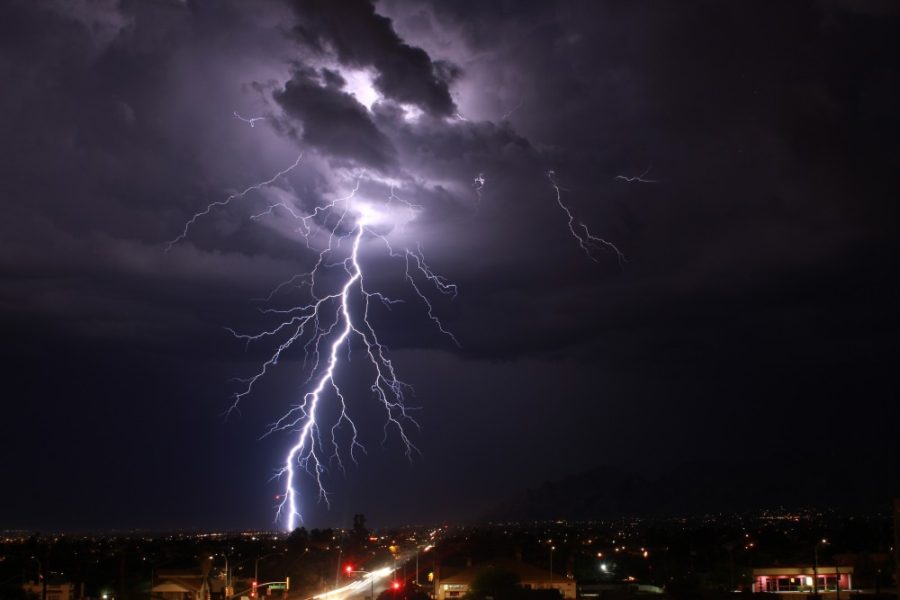Every May, complaints about going home start flying as students pack up their dorms, apartments or houses in preparation to move back home for the summer.
“I’m gonna try to stay through my lease,” some say, or “I wish the dorms let you stay for the summer!”
Well, from one Tucson native, here’s my advice: No, you absolutely do not want to stay in Tucson for the summer. Here are my top three reasons why Tucson in the summer is, in fact, probably one of the most miserable places on Earth.
1. You already know it: the heat.
Probably one of the first reasons that anyone with a brain would come up with, but not one to be forgotten, is the fact that the heat in Tucson is incredible. What students don’t always realize is that though the heat is nearly unbearable as they’re packing up their parent’s cars in May, come August, the scorching temperatures make walking across campus totally hellish, and the in-between is significantly worse.
In 2020, temperatures in Tucson reached over 100 degrees for a total of 108 days, and this year’s first triple-digit temperature was reached two weeks earlier than it was in 2020, on May 13. Not a great sign for us.
May usually marks the first of the triple-digit temperatures, though June entails a long month of bitterly dry heat accompanied by the hot wind. Don’t know what that feels like? Open a hot oven and put your face near it for a moment. It’s something like that.
July means monsoon season — five-minute long storms bringing pouring rain and thunder out of nowhere for about a month straight, ruining pool days at the most inopportune moments. Contrary to previous years, where Tucson has had record droughts, this year has been one of the wettest. The U.S. Drought Monitor even reported that the massive amount of rainfall the desert has experienced this monsoon season has made a significant dent in short-term drought effects. This is great news for the state of the Sonoran Desert, but what this means for Tucson residents is that your car is always dirty, near-daily rainfall disrupts most plans, and worst of all, easily-flooded streets block access to many neighborhoods and shopping centers.
While monsoon seems like a break from the heat, it also brings with it humidity that Tucson rarely experiences the rest of the year. The mornings in July are typically especially humid, which means that waking up early to go for a run is just as miserable as it would be later in the evening.
Regardless of the statistics, the fact is that experiencing the record-breaking temperatures Tucson records from as early as April until as late as October wears on both the soul and literally everything else.
Playgrounds become a hazard in the summer; the metal threatens to blister children who try to play on it. Getting in the car is equally dangerous — everything from the fasten on the seatbelt to the gear changer to the steering wheel is superheated. Dogs have to wear special boots to be walked even in the evenings because the pavements are so hot it can burn their feet.
2. No one is here.
This one is short and sweet — for all that everyone claims they’re staying in Tucson for the summer, they’re simply not. The University of Arizona boasts the highest percentage of out-of-state students of all Arizona’s state universities, with 31% of its students hailing from other areas in 2013. With that many students returning home to their families, and all other Arizona students returning to their respective cities, there are just not many people left in Tucson, even given the handful who stay behind in their rented apartments or houses.
It’s not just college students, too. Snowbirds, who are people who come to Tucson to escape the cold winters in their homes, which they return to when the brutal Sonoran summer rolls around, count for a significant population of Tucson residents half the year. The point is: you’re not missing out on anything.
3. No one is here — business edition.
For those of us college students who work at businesses whose target or even primary customer base is students (i.e., Illegal Pete’s, Gentle Ben’s, the University Boulevard boutiques, just to name a few), kiss your customers goodbye. The summer means long shifts, low paychecks and sometimes reduced or altogether closed business operation hours. Even back in 2006, the Arizona Daily Star published articles about how businesses were affected by the massive amounts of people who leave during the summer. Most jobs you’ll work during the summer will have a pretty heavy emphasis on the decline of customers for the summer, which means that’s most likely less hours (and tips) you’re likely to get.
Long story short, if you’re not dissuaded by the heat, the loneliness and the unpromising paychecks, you’re probably either incredibly stubborn or you really hate your hometown — but if you’re at home, wondering what it’s like on campus, don’t. You’re really, really much better off wherever you are.
Sincerely,
A T-Loc.
Follow Amanda on Twitter

Mandy (she/her) is a junior studying journalism and public relations. She spends her free time shopping, writing and hanging with friends.









